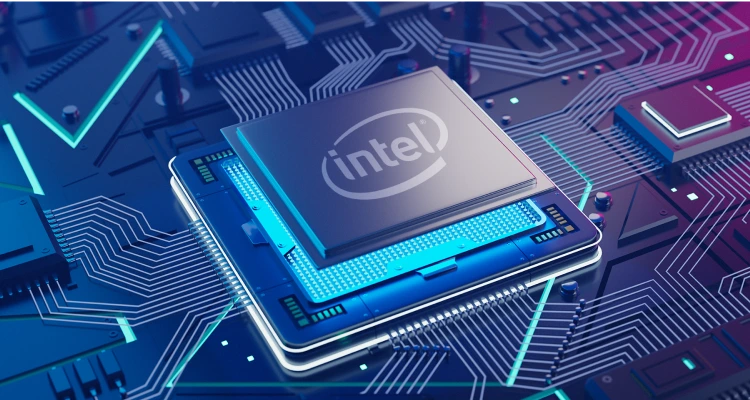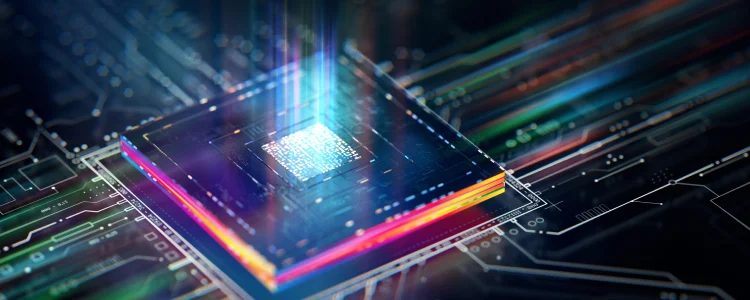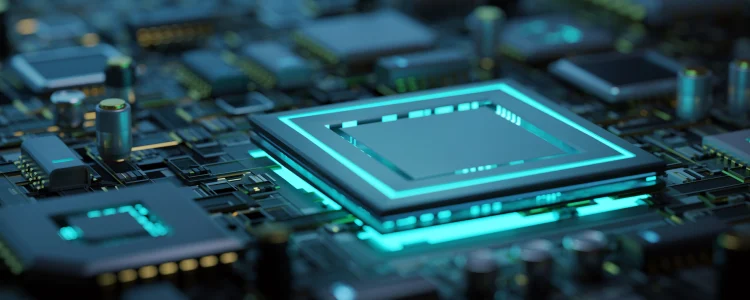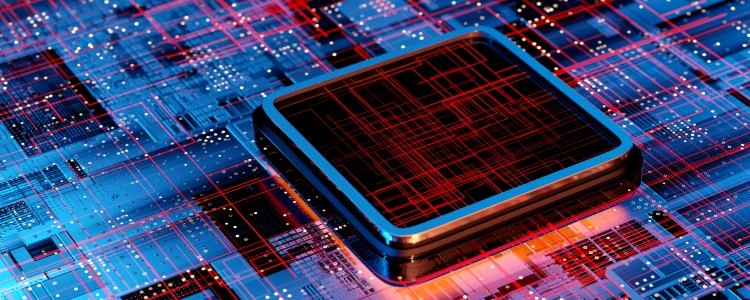Intel Xeon Processor Comparison: How to Choose the Best Server CPU for You

When searching for an Intel Xeon CPU for your professional workstations, you should choose the most cost-effective CPU based on several factors. The intended workload, workstation applications to be used, compatibility with other components, and energy efficiency will all impact the high performance computing power of your server environments. It’s important to note that server processors differ from regular desktop CPUs in that they offer performance capabilities that are quite robust compared to your average desktop CPU.
Server processors are chipsets built specifically for high performance computing and usually offer high core count and throughput compared to a desktop PC. They are the brains of your server and all it’s components, interpreting and executing complex instructions, processing data, and performing various tasks, like running database queries, executing AI workloads, and processing web page requests.
Your common desktop CPU differs from a commercial or enterprise-grade server CPU in several ways. Enterprise versions of Xeon server processors commonly operate at nearly 100% performance capacity all the time and typically continue to do so for the life of the unit. Because of this, processors within servers use the very highest-quality parts available during the manufacturing process. Let’s break this down into a bit more detail to help you better understand the main differences found in today’s Intel Xeon processors for enterprise computing.
With over 20 years of high performance server infrastructure development as well as experience in server hosting and management ServerMania has experts that can provide valuable insights and recommendations for selecting the most suitable Intel Xeon processor for your server applications and intended workloads. Check out our Buyer’s Guide to Xeon Servers to find out even more.
What are Server CPUs?
A server CPU is the central component that drives the entire server system. It manages all computational tasks and facilitates communication between software and hardware components. The performance of the server is directly tied to its speed and responsiveness.
Many recent server designs have shifted their focus from traditional CPUs to specialized chips that do well at specific tasks, such as speeding up video encoding or handling AI applications. There is a key difference between server-grade and consumer-grade CPUs. Server CPUs are designed to handle heavy workloads, high traffic, and 24/7 operation. They have more cores, larger caches, and support for ECC (Error Correcting Code) RAM. This makes them more expensive than consumer-grade CPUs and more reliable and efficient for server applications.

Components of High-End Server Processors
You might encounter terms like cores, threads, and frequency when looking for a server CPU. So, let’s take a closer look at these specifications to give you a better understanding of how these components work.
Motherboard: Why is it important to consider compatibility with motherboards? If the CPU is your server’s brain, the motherboard is your computer’s primary circuit board and acts as the heart and soul of your system. It houses the main tech components of your computational architecture, including your RAM (L1, L2, L3 cache), peripheral connectors (PCIe), input/output ports, sockets, and other important components.
Every computer, whether desktop or enterprise, has a motherboard. Its role is to facilitate communication among the various components that are attached to it. It allows you to store and retrieve data on a storage device and streamlines the necessary computations to support software applications. Among the components attached to your motherboard is the CPU. So, your motherboard must be compatible with your CPU, otherwise it will not function.
Clock Speed: Throughout this article, you will read references to a variety of critical components that make up your server, and one of the most important features is clock speed.
Clock speed is measured in gigahertz (GHz), and the way to measure it is pretty simple: the higher the number, the faster the unit. Your processor will continuously compute calculations and process billions of bits of data per second. You can expect very good performance, reliability, and responsiveness with higher clock speeds, if you are running resource-intensive applications.
Cores: A multi-core CPU, like that found in our Intel Xeon 6 Core Servers, has six cores on a single integrated circuit. These cores read and execute computer instructions, greatly increasing processing efficiency and power. Your machine may have an Intel core.
Older generations have one core. Big tech firms like Intel have subsequently expanded capacity by developing dual-core (Core i3), quad-core (Core i5), six-to-eight cores (Core i7), and now the astonishing multi-thread core CPU. In a multithreaded program, threads may share CPU caches, computational units, and the translation lookaside buffer (TLB) of one or more cores, which allows the CPU to store the recent translations of virtual memory to physical memory.
In the early 2000’s, an application crash could knock down the entire server environment due to OS instability. Additionally, older CPUs lacked adequate resources to analyze and process data reliably. A single-core CPU could only execute one program. With the onset of multi-cores we are now able to run numerous apps effectively.
Threads: If the core count is the physical number of cores on the chip itself, the thread count is the number of individual application threads that can be executed simultaneously on the CPU itself. Threads are similar to the number of cores. For example, ServerMania’s Intel Xeon W Series processors have anywhere between 8 and 20 threads of CPU power.
A system’s cache is used by the processor to increase the speed and reliability of access to the instructions and data between the processor and the RAM.

Intel Xeon CPU Processors
Intel processors are some of the most popular CPUs on the planet and are used in both desktops and commercial-grade servers. They come in a spectrum of models such as Xeon, Pentium, Core I7, Core I9, Celeron, and the x86. Each generation comes with a different name, and Intel happens to really like lakes. Some iterations are called Cascade Lake, Kaby Lake, Ice Lake, and Skylake, just to name a few.
Intel Xeon processors are currently available in a range of models and come in the following series: Xeon E, Xeon W, Xeon D and Xeon Scalable, each of which has been developed to handle varying workloads.
Intel first launched it’s Xeon processors in 1998, and it has since become the de facto industry standard for commercial and military-grade servers, not to mention one of the most reliable series on the market.
The Xeon Scalable Processors deserve a special mention as they represent a type of architecture that provides a reduced set of computing instructions for microprocessors, allowing for faster processing and a more dispersed data load, providing optimal performance.
Intel Xeon servers are feature-rich; these machines come with high-capacity turbo speeds and a minimum of 32 GB of memory.
What is the Cost of Intel Xeon Processors?
Now that you understand server components work alongside your CPU, you can choose your own processors and server, understanding that Intel Xeon processors and servers are more expensive than Intel Core processors, for the most part.
For example, the lower-speed Intel Xeon E3 is suitable for a lower-speed web server with high energy efficiency. It’s as affordable as some of the Core i5 processors, which are regular desktop-grade CPUs and comes standard with a quad-core and advanced features. This makes it a good choice for some less resource-intensive tasks, such as media servers or e-commerce hosting, and offers great value for your money.
On the other end of the scale, take the Intel Xeon E5, a high-performance, multi-socket configuration support processor loaded with security features. This is part of a family of mid-range commercial-level x86 microprocessors.
Renting a Xeon processor costs between $70/month for a single Xeon processor and up to $369/month for the 2x Intel Xeon Silver 4214R 24 Core Dedicated Servers. Renting a processor is typically a much more economical solution for a business due to constantly improving server components and the demand for server resources. Instead of buying a server CPU today and replacing it in a year or two, you can rent a server in a data center for a low monthly price and upgrade to a new server whenever your needs change.
Once you’ve ordered your new server, it’s time to set it up and secure it. Reach out to us today to book a FREE consultation to discuss your specific requirements.

What factors should I consider when choosing a CPU?
Step by step
1. Review Hardware Recommendations for Software
Compile a list of the primary software applications that you plan on running on the server and review the hardware recommendations that each developer presents on their website. This will provide a good starting point, and some developers will identify a recommended CPU or clock speed for the software.
If the developer doesn’t have any recommendations, use a search engine and forums to see what hardware other users are using. If you are running more than one core application, make sure that your selected CPU has the resources to run all your applications.
2. Determine the Number of Concurrent Users
CPU load will vary greatly depending on the number of concurrent users on the server. While one website may run on cPanel with a single 2.0GHz core, if you plan on hosting a thousand sites on one server, you will need to extrapolate the recommended CPU requirements accordingly.
If you have many users on a server, you may find it to be more economical to split the CPU load between several servers rather than try to fit all of your users on one server.
3. Consider Future Growth
Based on your current growth rate, you may have some idea how many concurrent users will need to be accommodated by the server in 3-6 months. Make sure to choose a CPU that can handle this growth, unless you plan to add more servers to handle new users. While your decision on which CPU to choose is likely one of the most important, you will also want to look at other components when considering future growth. This includes items such as the graphics processor, the cache size and requirement (the L3 cache feeds the L2 cache, which feeds the L1 cache, which feeds the processor), the level of support you will require from your solutions provider, and the price.
4. Speak to An Expert
If the previous steps haven’t guided you toward a concrete CPU choice, you should consider browsing ServerMania’s dedicated servers. Our server experts help personal and business users choose the right CPU for their daily needs. They will listen to your requirements and help you choose a server that will perform well for you based on your needs. They will help you compare the various models within the series to ensure the right fit for you.
What is the best server CPU?
Since every project is unique, there is no one best server CPU. Review these descriptions of our popular Intel Xeon W Series and E series CPUs to help you decide on one that fits your needs and budget. Each of these systems comes with a variety of features, including 10 Gbps network speed in New York, Los Angeles, London, and Montreal, and all support ECC Memory.
You may also want to check out our buyer’s guide to Xeon Servers.

Compare Processors
Intel Xeon E-2246G
This processor is one of the Intel Xeon 6 Core Servers groups. With 6 cores and 12 threads at 3.6 GHz, this processor delivers an impressive PassMark of 13,957. It is the perfect match for even the most demanding business analytics tasks.
Ideal Uses: Cloud Computing, Real-Time Analytics, and Big Data Insights
Intel Xeon W9-3495X
Intel Xeon W9-3495X is a 56-core workstation processor in the Intel W Processor Series that crushes the AMD Threadripper in the Cinebench R23 benchmark. It has a base frequency of 1.9 GHz, a max turbo frequency of 4.8 GHz, and 105 MB of cache memory. It also has an unlocked multiplier, allowing it to be overclocked.
Ideal Uses: Game Servers, Machine Learning, Big Data
AMD Ryzen 9 7950X
AMD Ryzen 9 7950X is a 16-core, 32-thread desktop processor with a base clock speed of 4.5 GHz and a maximum turbo-boost of 5.7 GHz. It has 64 MB of L3 cache, 16 MB of L2 cache, and 5 nm production. The processor is designed for gamers and creators and has hyper-fast single-core and multi-core performance. It also has Radeon graphics and supports AMD EXPO and AMD Ryzen technologies.
Ideal Uses: Crypto Mining, Big Data Analytics, Gaming, Video Encoding, Rendering,
Dual Intel Xeon Silver 4210
With 20 cores and 40 threads at 2.20 GHz, the Dual Intel Xeon Silver 4210 processor delivers an impressive PassMark of 14290. It is the perfect match for even the most demanding business analytics tasks. Intel Xeon Scalable, 2S only. It also includes 64 RAM, max Turbo Frequency 3.20 GHz, and 10Gbps Network Speed ready.
Ideal Uses: Game Servers, Machine Learning, Big Data
Dual Intel Xeon Silver 4214R
The Dual Xeon Silver 4214R is a dual 12-core (24 cores total), 2.4 GHz (x2) processor with enhanced SpeedStep technology, which allows tradeoffs between performance and power consumption. It also has Thermal Monitoring Technologies, which protect the processor package and the system from thermal failure. The VT-x with Extended Page Tables (EPT), also known as Second Level Address Translation (SLAT), provides acceleration for memory-intensive virtualized applications.
Ideal Uses: Basic virtualization, Web Hosting, Enterprise-level workloads
Now that you are a pro when it comes to choosing a CPU for your server, you can begin your search. Renting a server and CPU can be more economical and avoids costly updates as new and improved tech becomes available. There is a range of CPUs to choose from based on your requirements, whether you are processing graphics at a workstation, mining crypto, or simply require a gaming system, the brand we often recommend is Intel. You can view all our dedicated server options here.
Need Help Choosing A CPU?
We hope this helped with your decision-making and development process. ServerMania experts have decades of experience choosing the right server or processor for every project. Book a free, no-obligation consultation, and we’ll prepare a custom quote that fits your needs and budget.
Was this page helpful?

